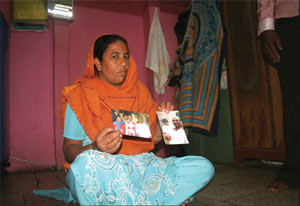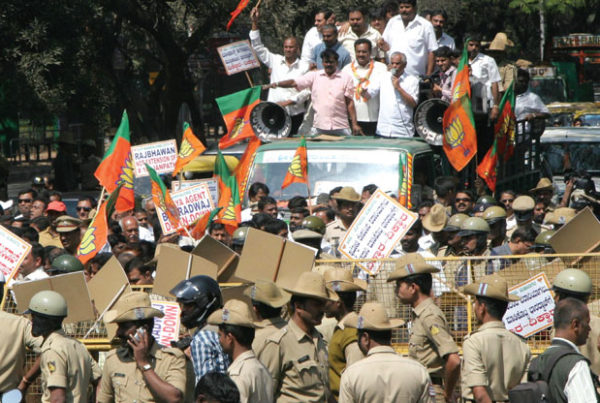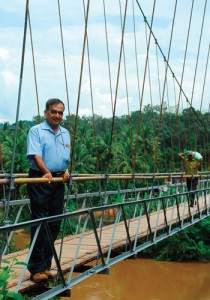WERE YOUTHS IN VADODARA BUILDING A ROCKET LAUNCHER?
In a case flawed with broad incongruity and marred by deep prejudice, Sanjana Chappalli speaks to an accused in another alleged terrorist plot in Gujarat
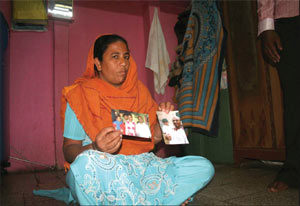
Pictures and Frames: Mehrunnissa Ismail holds up photos of her arrested husband and missing son. Photos: Gaurav Shah
AN SMS joke that surfaces frequently talks about three possible ways to catch a tiger. Plan A: Ambush the tiger; shoot it dead. Plan B: Lay a trap; capture the tiger alive. Plan C (known as the IPP – Indian Police Plan): capture a cat; beat it till it confesses to being a tiger in disguise. Then, proclaim you have captured a tiger alive.
For anyone who has taken a closer look at police arrests of suspected terrorists across India, the message can evoke only hollow laughter. In the recent spate of arrests of suspected terrorists by the Gujarat Police, life imitates (SMS) art.
On September, 6 Rakesh Sharma, ACP of Vadodara called a press conference to announce the arrest of five men — Usmangani Nawab, Ameen Razaak Shaikh, Iqbal Shaikh, Mushtaq Ismail Shaikh and Zaheer Abbas Shaikh — from the Hathikhana locality in the city. The police claimed that the five had planned to bomb the Ganesh Visarjan Yatra, an annual religious procession. The explosions, the police say, were meant to injure Hindus and trigger communal riots.
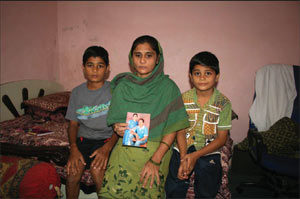
Samina Iqbal with her children shows a photo of Iqbal Shaikh
Sharma named 23-year-old Zaheer Abbas, the youngest among the five, as the mastermind. Zaheer’s confessions, Sharma said, not only led the police to the others but also helped them recover a rocket launcher, five sutli or rope bombs, a packet of grey powder, some nails and tiny iron balls. The FIR registered on 5 September stated that the men were being arrested under the Explosives Act and the Arms Act for possession of explosives and the Indian Penal Code provisions that punished criminal conspiracy and the promotion of enmity between two religious communities. Sharma also talked of how the five were responsible for a crude bomb explosion in October 2008 on the eve of Dussehra. In the riot that followed, no one died but several shops owned by Muslims were looted and burnt. Frustrated by the minimal destruction, Sharma said, the group planned to fire a rocket at the particapant of this year’s Ganesh Visarjan Yatra, hoping to cause the maximum damage. On September, 23 the police announced the arrest of two others — Kalu Ismail Malik and Raees Rashid Shaikh — bringing the total arrested in the ‘rocket launcher case’ to seven.
A detailed examination of the FIRs, police custody remand requests and court documents reveal insurmountable flaws in the police version of events.
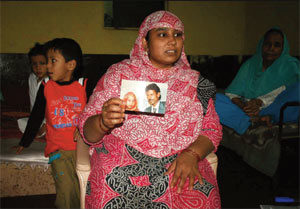
Shabina Usmangani with a photo of her husband Usmangani Nawab
According to the FIR, the desi rocket launcher is described as a “hollow iron pipe with a diameter of 1 inch” that “could possibly be a rocket launcher.” At one end of the pipe was a coupling, says the FIR. Besides the pipe, the FIR describes a packet of grey powder that “look[ed]” like gunpowder. The police have sent a sample to the Forensic Science Laboratory in Ahmedabad to verify the contents. A couple of nails and tiny iron balls were found next to the packet. Five sutli (rope) bombs were also found amidst these.
The FIR goes on to describe the location where these items were found. IU Patel, a Vadodara-based advocate whose arguments secured bail for one of the seven, says that the police description of the rocket launcher was a far cry from a real one. “Even if it was a rocket launcher, it was not assembled and could not have been fired at all. The FIR states that these were found on top of an abandoned pushcart in the busy Hathikhana market area. Where was the igniter to fire a rocket from this launcher? And would anyone assemble it in the market?” asks Patel incredulously. In court, these arguments secured bail for Ameen Razaak Shaikh. Perhaps afraid that the rest of the bail applications would also be similarly accepted, the police then claimed they found three witnesses who had overheard the men talk of launching a rocket and had seen them place the material on the pushcart. Mohammed Hanif Shaikh, representing the accused along with Patel, says that the witnesses have been propped up by the police. “The witness’ statements are being recorded before a magistrate. They told me they were surprised to hear their names announced by the police. Let’s see what they have to say in court,” says Mohammed Hanif. He has filed an affidavit asking the police to investigate if the materials seized are available freely in the open market. “There are other questions to be asked,” he says, “The police claim that the arrest foiled the plot to bomb the Yatra. The Yatra took place on September 3. If the men were arrested after the Yatra on September 5, why wasn’t there an explosion, as per their plan?” Besides lessthan- ironclad grounds of arrest, there are allegations of illegal detention and torture levelled against the Gujarat Police which the National Commission for Minorities (NCM) has taken note of.
AN INCH-THICK PIPE AND A PACKET OF GREY POWDER THAT ‘LOOKED’ LIKE GUNPOWDER WERE SEIZED
This correspondent met Iqbal Shaikh at the Vadodara Central Jail on October 21 along with his children, wife, sisters and mother on their weekly visit. A police constable recorded every word exchanged. Despite the constable’s presence, Iqbal talked, in a voice that could barely hold back pain. Disputing the fact that they were all arrested on September 5, the date the FIR was registered, Iqbal talks of being illegally detained and tortured for five days. “I was taken away by the police on September 1 at 4 pm. I was blindfolded, hooded and driven to a house out of the city. No one told me where I was being taken or why. In the five days they kept me there, I was mercilessly beaten with iron rods, tied upside down, flogged and administered electric shock several times a day. Live electric wires were attached to our feet and private parts,” says Iqbal. His voice was steady and he never looked away – not even for a second. “Ever since I was handed over to the jail authorities, I have been asking for medical treatment. All I am given are painkillers and sleeping pills,” says Iqbal. Throughout the visit, unable to stand, he chooses to squat on a ledge adjoining the prison grill. There is a lot more to be shared, but time is precious. He wants to spend the remaining visit time with his family. A few days later, Iqbal repeats his account of torture and illegal detention before a magistrate.
IQBAL’S FAMILY members validate his account. For six weeks now, they have heard horrific tales of torture during their visits. Zaheer Abbas talked to his brother of having his hands tied to the handlebars of two motorbikes and being forced to run to keep pace with them. If he faltered, a policeman behind him would beat him. “Zaheer has a terrible skin allergy that is aggravated by direct exposure to the sun. We rarely allowed him outside. He stopped school after Class 10, unable to stand the sun. He went to pray at the mosque only in the evenings. The whole day he would stay at home with me,” says mother Rahima Amiruddin Shaikh. “According to the police, this is the group’s mastermind!”
A MAN ACCUSED OF INVOLVEMENT IN THE OCTOBER 2008 RIOTS WAS ALLEGEDLY IN LONDON AT THE TIME
Between September 1 and September 5, the families went from one police station to another to trace their men. “We met the police commissioner on September 4. He told us that the police had taken them away since their lives were in danger. We were asked to return the next day,” says Zaheer Abbas’ eldest brother, Moinuddin Shaikh. Records of their visit are in the police visitor diary, says Moinuddin. The next day, the 5th, the families were allowed to see their men. “None of them could walk. They were held up by at least two policemen. Their feet dragged across the floor, their hands were limp,” says Shabina Usmangani, whose husband Usmangani Nawab was one of the five arrested. A day later, on September 6, the police announced their arrest at a press conference.
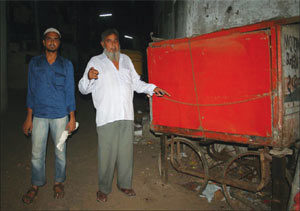
Crime scene? Zaheer’s relatives asks why the ‘rocket launcher’ materials were allegedly stored above and not in the pushcart
This was not the only discrepancy. On September 23, the police claimed that they arrested Kalu Ismail Malik. But this was 12 days after Kalu Malik presented himself to the Ahmedabad Anti-Terrorist Squad (ATS). Kalu’s wife Mehrunnisa tells TEHELKA that at least four people were with her husband when he surrendered in Ahmedabad. The police, she says, are also looking for her eldest son, Sajid. “He has run away from home. Considering what they did to his father, an innocent man who presented himself voluntarily to the police only to be beaten up, why would Sajid turn himself in?” she asks.
A week after the families deposed before the NCM in New Delhi, alleging illegal detention and torture, pressure on the families began to mount. Police informers, the families claim, are pressurising them to sign blank statements and not talk to the media. “They have even offered us money to keep quiet,” says a near hysterical Shabina Usmangani. “I will pay them if they provide proper medical treatment to my husband. I am not asking them to drop the case against them. I am confident of my husband’s innocence,” she says categorically. An hour later, Iqbal Shaikh’s brother Javed comes up with a startling revelation. “The police accused my brother of being involved in the October 2008 violence. In October 2008, my brother was working in London as a tailor. He returned to India on June 21, 2009,” says Javed. In his hands are photographs of Iqbal and his wife posing before the Tower of London. “Are they going to torture people to confess to crimes they have not committed?” asks Javed.
A resurrection of Plan C from the SMS joke?
—
This article was originally published in Tehelka, a leading independent news magazine in India, known for its investigative journalism.
